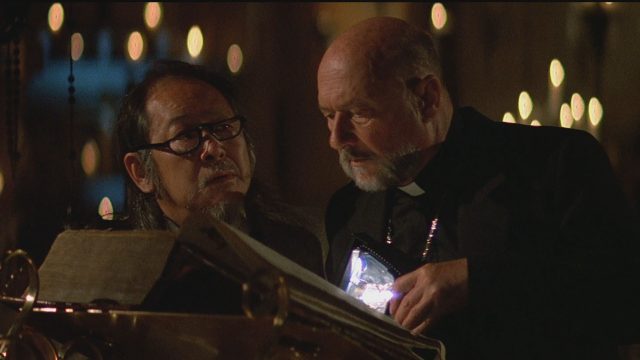Let’s talk about our beliefs, and what we can learn about them. We believe nature is solid, and time a constant. Matter has substance and time a direction. There is truth in flesh and the solid ground. The wind may be invisible, but it’s real. Smoke, fire, water, light — they’re different! Not as to stone or steel, but they’re tangible. And we assume time is narrow because it is as a clock — one second is one second for everyone! Cause precedes effect — fruit rots, water flows downstream. We’re born, we age, we die. The reverse never happens…None of this is true! Say goodbye to classical reality, because our logic collapses on the subatomic level…into ghosts and shadows.
— Professor Birack, Prince of Darkness
John Carpenter, like the vast majority of horror creators, was always cursed to be known as a schlockmeister first and foremost. His ’70’s and ’80s run, which stands as one of the greatest sustained periods in any American filmmaker’s career, was littered with movies that were commercial underperformers or critical punching bags (and often both). Only around the turn of the millennium did he finally begin to get his due as one of the great horror directors, and only recently that he began to be recognized as one of great American directors, period.
The heart of his legacy is what he has dubbed his “Apocalypse Trilogy”: The Thing, Prince of Darkness, and In The Mouth Of Madness. These thematically linked works deal with cosmic horrors that obliterate the victims’ sense of self and possibly all life on earth. While most of Carpenter’s movies have a sneaky sense of humor, these three are defined by their seriousness, and any comedy present is of the pitch-black variety. If these movies had been released 30 years later, it’s easy to imagine that they would be filed under “elevated horror.”
The label would be a poor fit for all of them (their first impulse is to terrify, though as with all things Carpenter, he never settles to merely scare), but especially for Prince of Darkness. The plot revolves around a group of quantum physics research students whose professor (Victor Wong, who previously worked with Carpenter in Big Trouble in Little China) leads an investigation into a mysterious container of swirling green liquid in the basement of a monastery. As it becomes clear that the liquid is actually the Antichrist, it begins to break out and possess both the students and the local homeless population (led by Alice Cooper, who also performs on the soundtrack). Meanwhile, the research team and the priest who invited them (Donald Pleasance, from Carpenter’s Halloween and Escape from New York) begin having prophetic dreams broadcast to their subconscious by an alien race, of which Jesus was a member. As that summary makes clear, this is a movie with a deeply goofy mythology, the sort of thing that could become comedy in the wrong hands.
The fact that it doesn’t is a credit to Carpenter and his collaborators. One thing that becomes clear looking through his filmography is that he knows how to work with a team; he rarely collaborates with any technical crewmember just once. Here, his team is honed to a cutting edge: there are images here, like the giant hand reaching through water towards a glowing mirror, that rank with the most haunting in Carpenter’s entire oeuvre. And Carpenter (who wrote the screenplay under the pseudonym Martin Quatermass, a nod to the British serial Quatermass and the Pit, the movie’s main influence) gives Wong and Pleasance some great conversations to chew on. More than most films of its era, Prince of Darkness is interested in discussing the intersection between science and religion and seeing if the one can inform the other.
Like most of Carpenter’s movies, Prince of Darkness attracted vitriolic reviews, calling it cheesy and its characters one-dimensional. And while it is the weakest of the Apocalypse Trilogy, it occupies an interesting middle ground between the pure sci-fi horror of The Thing and the metafictional/supernatural conceit of In The Mouth Of Madness. Carpenter has largely retired from directing after the barely-released Amber Heard vehicle The Ward and seems to enjoy a life of making music and playing video games. But it’s hard not to hope that someone like Jordan Peele (who has claimed Carpenter as his biggest influence) can pull him out of retirement. Maybe, for the first time in over 40 years, the world has caught up to him.
Prince of Darkness is available to rent on Apple TV, Amazon Prime, Google Play, and YouTube

